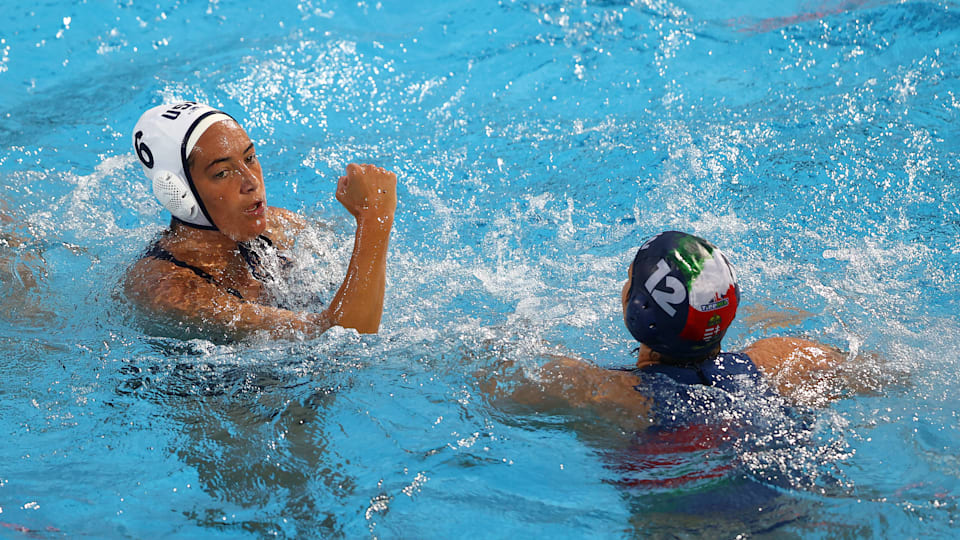Three-time water polo Olympic champion Maggie Steffens on secret to American dominance: "The hardest part is staying at the top."

The 30-year-old wants to leave a legacy in her sport that goes well beyond medals, one that paves the way for other young women to follow their sporting dreams
After three Olympic golds, four World titles, and three Pan American Games wins, American water polo player Maggie Steffens says the most difficult feat might be staying atop the mountain she and her women's team have climbed over the last 11 years.
“The hardest part of the journey is staying at the top,” Steffens told Olympics.com in an interview following USA’s opening round romp of hosts Chile, at the 2023 Pan American Games in Santiago.
Steffens was part of a historic USA squad that captured the nation’s first-ever Olympic gold medal in women’s water polo at the London 2012 Games.
The U.S. followed that success up with gold medals at Rio 2016 and Tokyo 2020 in 2021.
“You think about hiking a mountain or climbing a mountain, and no one really talks about staying there,” explained Steffens. “People talk about getting there, and then what? For us, it’s thinking about how do you stay there? It’s really difficult. The winds are high, you’re tired, you’re hungry.
“It’s being able to absorb the pressure, absorb the winds, whatever that may be,” she continued. “There’s always another mountain to climb.”
Throughout Steffens’ career, the U.S. has found the top – time and time again.
But a shock loss at this year’s World Aquatics Championships to eventual bronze medallists Italy in the quarter-finals means they have something to prove.
“We love the pressure,” said Steffens, “and clearly, we didn’t perform as well as we wanted this last Worlds, and someone else was on top. We’ve got to keep working on how do we climb each step, each challenge, each difficult to get there, because that’s definitely where we want to be.”
Building a legacy
Steffens’ climb isn’t just about medals, however.
“I think growth and development is one of the greatest things we can have not only as athletes, but as people,” Steffens said. “There’s better things that I can do. I can be a better lead. I can be a better teammate. There’s more growth in water polo, more growth in women’s sports.
“How can I help leave that legacy and continue to get better as a player, as a teammate, as a leader, as a female role model,” she concluded.
Over the course of her career, she’s seen the sport grow and change. The game against Chile on Monday (30 October) was a highlight – and one that shows the progress that’s been made.
“There were hundreds of fans all cheering and singing and so proud to be watching the women’s Chilean water polo team,” recalled a jubilant Steffens. “When else has that happened? Lots more people came to this game to cheer on the Chilean women’s water polo team than an NCAA final of women’s water polo in America. That’s showing growth. All you need is a moment like that.”
The next generation
Steffens hopes that moments like that will show young women around the world what’s possible.
“I would just love to see more exposure, it’s so important to see it to be it,” she said.
Growing up, Steffens had plenty of examples with an athletic family that includes water polo players in her father and her sister.
“I was exposed really to water polo balls, to being at the pool, to seeing a water polo game, so although I wanted to be an Olympic soccer player – that was my dream – there was this little thing in the back of my head saying, ‘Oh, that yellow ball’ or ‘Oh, I love the water,’” said Steffens. “That exposure to me was so important.”
With that exposure for others, says Steffens, anything is possible.
“I really believe in dreaming big and seeing somebody that you want to be or five people that you want to be,” she said. “Don’t be shy to chase it. Why not you? Why couldn’t it be you?”